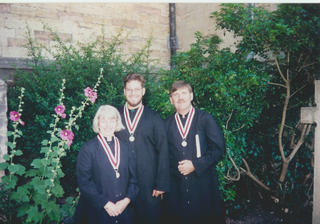
The following is a newspaper article published shortly after my mother's death:
Great Comfort Comes in the Small Gifts of Friends
I went to a funeral the other day. A woman I knew had died after a 10-month battle with cancer. Her name was Ginny Wilks.
I met Ginny more than 10 years ago when I joined the Chorus of Westerly after the death of my brother, Jay.
The Chorus is a group of 200 or so amateur singers, performing Summer Pops in Wilcox Park, plus two classical concerts, two pops concerts, and “A Celebration of Twelfth Night” each year at its performance hall at 119 High St.,Westerly, all under the direction of George Kent, a Pawcatuck native who is also the choir master of Christ church and a professor of music at the University of Rhode Island.
But during its nearly 40-year existence, the chorus has become much more tan that. For many of its members, it is a family, a family in nearly every sense of the word, filled with feuds and jealousies, acceptance and tolerance, love and forgiveness.
This is true, perhaps even more so, for Christ Church choir, of which Jay and Ginny were also members.
Jay was a Renaissance man for the Chorus, a sort of Mr. Fix-It building manager, stage designer and general contractor. I think it was the magic he loved, and the power the Chorus gave him to make magic.
He and his family toured England and Italy with the group. These were their dearest and closest friends.
I had been a member of the Chorus as a teen-ager, but then I went to college, got married and moved away. Although I saw Summer Pops every now and then, and attended the occasional “Twelfth Night,” I stopped singing.
When my father died in 1986, my husband and I moved back to town, and my attendance at Chorus events became more and more frequent.
Then, in 1988, Jay died. He had leukemia, and like Ginny, lost his battle with the disease in less than a year. Through a bone marrow transplant and all the therapy medical science had to offer, his extended family stood by him. They visited him when he thought he didn’t want any visitors. They sent cards that made him laugh hysterically, when really, there was nothing to laugh about. They helped him rediscover the best that was in him and around him, right up until the end.
That fall, I rejoined the Chorus. I was looking for Jay. I needed his strength and his confidence. I was hoping to find his spirit up in the dusty old rafters, his voice among the echoes of Brahms, Beethoven, Gershwin, and Berlin.
But I didn’t find him there. Instead, I found him in the people, the singers and the staff of the Chorus, who held and cherished their memories of him and, because I was his sister, welcomed me with open arms.
Ginny was one of these people. Always kind and gracious, there was something deeply spiritual about her, as if she were grounded, solid in her beliefs.
I was a stranger, a little afraid, trying to fit in. Yet every time she spoke to me, she put me at ease. She made me feel like I belonged. She looked me right in the eye and gave me her complete attention, despite the chaos whirling around, and however innocuous the conversation.
I don’t think I was special to Ginny. I think she treated everyone this way. What was, for her, standard operating procedure, was, for the rest of us, a gift of welcome with every conversation.
I never told her how much this gift meant to me, how it helped my get used to my new life. And I didn’t want to go to her funeral. I’d been to enough of funerals, I thought. No one would miss me. It would just make me feel bad.
I did go, maybe because I knew Ginny had another gift for me.
It was hot, and Christ Church was packed. Some 400 people had come – Chorus members, people who knew Ginny from her work at Christ Church, as a manager in Dr. John McGowan’s office, as a director of the In-Harmony Therapeutic Riding stables.
Ginny’s brother spoke, as did her son. And the choir and organ were in wonderful voice.
Toward the end of the service, a long line formed for communion. There were so many to serve. As I watched the mourners, one by one, return to their seats, I was taken aback by the number of faces I recognized – some friends, some family, some acquaintances, but so many of them.
Like flowers in a garden, one by one these people have bloomed in my life. Although I have focused on the individuals, on the single blossoms, not until that moment had I taken in the entire vista, had I recognized that life isn’t a string of events or list of accomplishments. It’s a gathering of friends.
I could feel Ginny smiling at my revelation. I think she had known this all along.
Sometimes, I picture myself standing in a pool of light cast by a small campfire in the middle of a vast, dark plain. Suddenly, faces have emerged at the edge of the darkness, hundreds of them, barely illuminated by the glow of the fire light.
An extended family has gathered around me. Under cover of darkness, they have circled my life. I’m not the most important thing to them, not even one of the most important. I stand at the edge of their lives just like they stand at the edge of mine. But what comfort that brings.
Thank you, Ginny.
The darkness doesn’t seem nearly as dark, the unknown not nearly as scary, when there’s a familiar face waiting to guide you in.
Jill Blanchette, August 2, 1998, as printed in The Westerly Sun